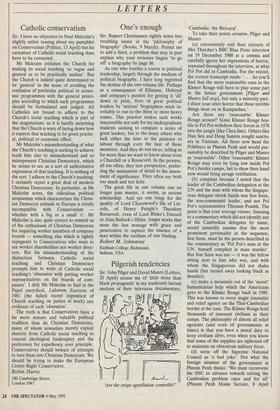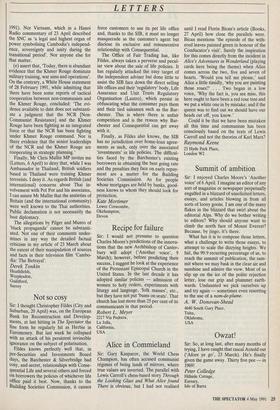Pilgerish tendencies
Sir: John Pilger and David Munro (Letters, 20 April) accuse me of 'little more than black propaganda' in my studiously factual analysis of their television documentary, 'Are the crisps appellation controlee?' 'Cambodia: the Betrayal'.
To take their points seriatim, Pilger and Munro (a) conveniently end their extracts of Mrs Thatcher's BBC Blue Peter interview on 19 December 1988 at a comma and carefully ignore her expressions of horror, repeated throughout the interview, at what Pol Pot did in Cambodia. For the record, the correct transcript reads: . . So you'll find that the more reasonable ones in the Khmer Rouge will have to play some part in the future government [Pilger and Munro full stop], but only a minority part. I share your utter horror that these terrible things went on in Kampuchea.'
Are there any 'reasonable' Khmer Rouge around? Some Khmer Rouge hos- tile to Pol Pot withdrew their forces in 1978 into the jungle (like Chea Sim). Others like Hun Sen and Heng Samrin sought sanctu- ary in Vietnam. All three now head the Politburo in Phnom Penh and would pre- sumably be described by Pilger and Munro as 'reasonable'. Other 'reasonable' Khmer Rouge may even be lying low inside Pol Pot's border camps, but to show their hand now would bring savage retribution.
(b) complain because I noted that the leader of the Cambodian delegation at the UN and the man with whom the Singapo- rean delegate shook hands was Son Sann, the non-communist leader, and not Pol Pot's representative Thiounn Prasith. The point is that your average viewer, listening to a commentary which did not identify any of the Cambodian delegates by name, would naturally assume that the most prominent personality in the sequence, Son Sann, must be the person described in the commentary as 'Poi Pot's man at the UN, himself complicit in mass murder'. But Son Sann was not — it was the fellow sitting next to him who was, and with whom the Singaporean did not shake hands (but turned away looking black as thunder).
(c) make a mountain out of the 'secret' humanitarian help which the Americans gave to the Khmer Rouge back in 1980. This was known to every single journalist and relief agency on the Thai-Cambodian border at the time. The Khmer Rouge hold thousands of innocent civilians in their camps. The philosophy of almost all relief agencies (and even of governments at times) is that you have a moral duty to keep civilians alive, even when you know that some of the supplies are siphoned off to maintain an obnoxious military force.
(d) write off the Supreme National Council as 'a bad joke'. Not what the foreign minister of the government in Phnom Penh thinks: 'We must reconvene the SNC to advance towards solving the Cambodian problem once and for all' (Phnom Penh Home Service, 8 April
LETTERS
1991). Nor Vietnam, which in a Hanoi Radio commentary of 23 April described the SNC as 'a legal and highest organ of power symbolising Cambodia's independ- ence, sovereignty and unity during the transitional period'. Nor anyone else for that matter.
(e) assert that, 'Today, there is abundant evidence that the Khmer Rouge dominate military training, war aims and operations'. On the contrary, a White House statement of 28 February 1991, while admitting that there have been some reports of tactical cooperation between non-communists and the Khmer Rouge, concluded: 'The evi- dence available to date does not substanti- ate a judgment that the NCR [Non- Communist Resistance] and the Khmer Rouge have been fighting as an integrated force or that the NCR has been fighting under Khmer Rouge command. Nor is there evidence that the senior leaderships of the NCR and the Khmer Rouge are cooperating in strategic planning.'
Finally, Mr Chris Mullin MP invites me (Letters, 6 April) to deny that, while I was Ambassador in Thailand, British soldiers based in Thailand were training Khmer terrorists. I deny it. As regards British (and international) concerns about Thai in- volvement with Pol Pot and his associates, I can assure Mr Mullin that the anxieties of Britain (and the international community) were well known to the Thai authorities. Public declamation is not necessarily the best diplomacy.
The allegations by Pilger and Munro of 'black propaganda' cannot be substanti- ated. Not one of their comments under- mines in any way the detailed factual criticism in my article of 23 March about the extent of their manipulation of sources and facts in their television film 'Cambo- dia: The Betrayal'.
Derek Tonkin
Heathfields, Worplesdon, Guildford, Surrey



















































 Previous page
Previous page